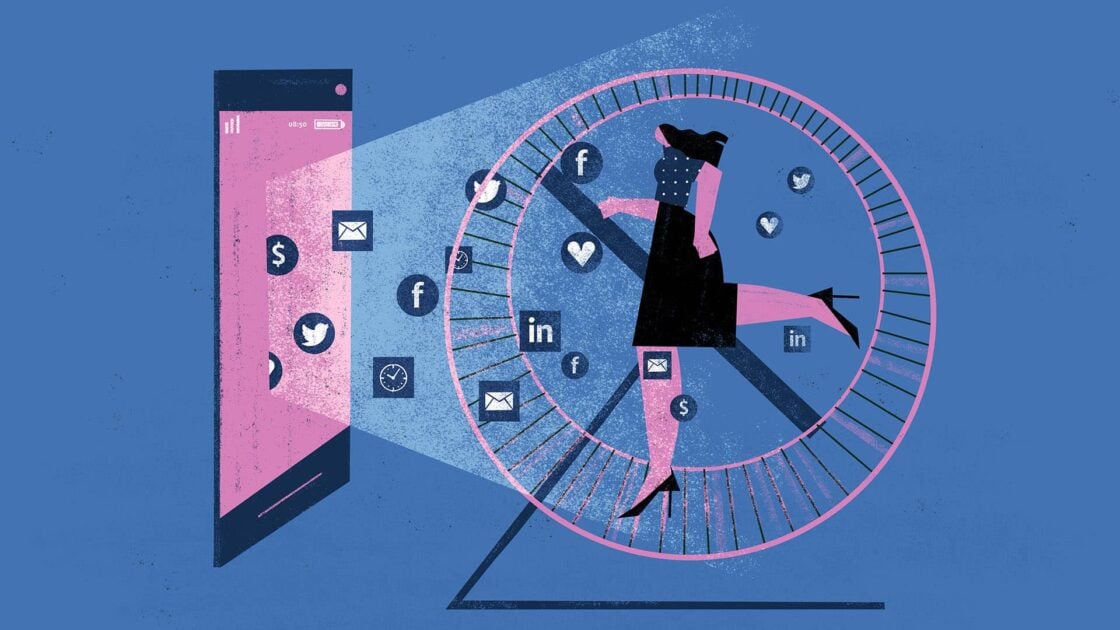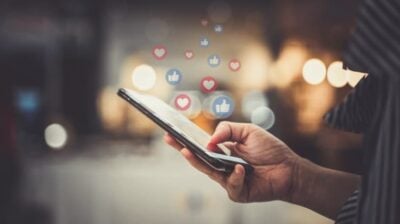The effects of social media on mental health
The positive and negative effects of social media on mental health

Many of us spend a lot of time on social media, on phones or laptops updating statuses, posting pictures, liking things, and messaging back and forth with friends. It’s where we get updates about our friends and family, share our experiences, and go to pass the time. In many cases, the effects of social media can be positive. For many people, social media can be a lifeline, allowing them to keep a connection with other people.
However, people have concerns about how social media can negatively affect mental health. For example, a study by the Royal Society of Public Health and the Young Health Movement explored how social media platforms affect mental health and wellbeing when looking at things like quality and amount of sleep, feelings of loneliness, bullying, fear of missing out (FOMO), anxiety, and depression. Although there were some negative outcomes in these areas, they found social media can also be extremely beneficial in several ways, for example, allowing for self expression, communicating with long-distance friends, self-identity, emotional support, and so on.
What often gets lost in the conversation around social media and mental health is the positive impact that online connection and technology can have on a person’s wellbeing.
Does social media have a negative impact on mental health?
Social media can get a lot of negative attention. There are a number of studies that look at the relationship between social media and mental health and whether or not it has a negative impact, and there are concerns that social media can lead to negative feelings like depression or anxiety, feeling more lonely or left out, losing sleep, or having negative experiences like cyberbullying.
Unfortunately, we currently do not have good quality research to know for certain how social media use can impact people, and lots more research needs to be done in this area before we can say for certain how much of a negative impact it is having on mental health and wellbeing.
Can social media be positive for your mental health?
Many people believe social media is a negative thing, but that’s not necessarily true. Instead of focusing on how social media platforms like Instagram, TikTok, Snapchat, Twitter, Facebook, or YouTube can have a negative impact on mental health and wellbeing, it’s better to look at the ways that it can be positive.
Some positives include the fact that it’s great for making and maintaining relationships with people, self-expression, self-identity, emotional support, and community building.
With any activity, it’s always best to use social media in moderation and make sure it doesn’t take over other areas of your life. If you do feel you are being negatively impacted, talk to someone about it. That being said, here are the ways social media can help to improve your wellbeing:
Connection with other people
Whether you have family overseas, a friend who moved away, or you just want to talk to someone who lives down the street, social media allows us to connect with other people. Our phones and devices are now important parts of our social lives. Apps like Instagram, Snapchat, TikTok and Facebook Messenger help us to keep in contact with our friend groups and keep up to date with what’s going on. Spending time with people offline is an important part of building connections with others, and these offline connections shouldn’t be replaced completely by social media, but that doesn’t mean the time you have spent talking online doesn’t count – it does. It’s also really important for our wellbeing.
Feeling accepted
It can be difficult to feel like you are different to other people or you can’t connect with those around you. It can also feel very lonely. Social media gives you the opportunity to find other people like you. It allows you to join communities of people who have similar experiences and similar interests. This can be especially important for people who feel like they are different to everyone else, people who are dealing with body image issues by learning about body positivity, or for people who are struggling with their identity or sexuality. The internet can be a space where you can find people who accept you for who you are, and can give you a sense of belonging, which can be very important for your mental health. Feeling accepted is positive for our wellbeing.
Expressing creativity online
Social media sites such as Instagram and YouTube offer a space where you can express your creativity online. Whether you’re interested in art, drama, singing, dancing, make up, writing, or other kinds of activities, you can share what you’re doing online, provide progress updates, and find a community of people who can support you in what you’re doing. It’s also a great place to get inspiration and motivation to keep going.
Be entertained
One of the reasons we spend so much time on social media is because it can be fun. Social media provides entertainment when we’re bored, something to do when we’re commuting or waiting around, and funny memes or videos to share with friends. Apps like YouTube or TikTok give us hours of entertainment and it can be a great way to de-stress and relax too, which can also be positive for your mental health and wellbeing.
How to know if social media is having a negative impact
While there are plenty of positives around social media, there are things to be aware of. Social media may begin to have a negative impact on other areas of your life if:
- Social media is taking over from real-world, in-person communication
- You are comparing yourself to others online and it is making you feel down or feel bad about your body image
- You have feelings of inadequacy and low self-esteem
- You are experiencing bullying or harassment online
- You are seeing a lot of content that is upsetting or that feels inappropriate
- You are confused by information online or are being mislead
- You would prefer to be on social media instead of doing other important things like eating, sleeping, spending time with others, or exercising
- You are using social media to distract yourself from how you’re feeling or to manage your emotions
- You have feelings of depression or anxiety whenever you go online
- You feel like you are always missing out when you see what other people are posting (also known as fear of missing out, or FOMO)
- You are receiving unwanted sexts or images
If you feel social media is having a negative impact or affecting your life, or you are experiencing feelings of depression or anxiety, it’s a good idea to talk to someone about what’s going on. Go to a friend, a parent, a family member, or someone in your school or college and let them know what’s happening and how it makes you feel. A doctor may be able to help you if you are struggling with sleep.
Seeing a counsellor can give you a space to talk about what’s going on and help you to manage the situation, whether you are experiencing depression or anxiety, cyberbullying, struggling with your body image, or you’re just having a hard time.
Always remember what you put on social media stays on social media and if you wouldn’t say it to a person in real life then it’s probably not a good idea to say it online either.
Feeling overwhelmed and want to talk to someone?
- Get anonymous support 24/7 with our text message support service
- Connect with a trained volunteer who will listen to you, and help you to move forward feeling better
- Whatsapp us now or free-text SPUNOUT to 50808 to begin.
- Find out more about our text message support service
If you are a customer of the 48 or An Post network or cannot get through using the ‘50808’ short code please text HELLO to 086 1800 280 (standard message rates may apply). Some smaller networks do not support short codes like ‘50808’.






